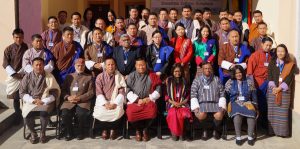Sonipat, May 29th, 2017: Even as the increasing penetration of online communication and digital transactions has revolutionized the world, it has also spawned a series of cryptic threats – the menaces of digital piracy, cyber stalking, sextortion and online infidelity.
The Jindal Institute of Behavioural Sciences (JIBS) of O. P. Jindal Global University (JGU) took the lead in highlighting these threats at the 26th session of Commission on Crime Prevention and Criminal Justice (CCPCJ) held recently in Vienna. JGU, the only university participant at the international convention organized two side events titled ‘Victims of Online Communication’ and ‘Psychosocial and Cultural Aspects leading to Digital Piracy’ in collaboration with World Society of Victimology and Centro Nationale de Prevenzione e Difesa Sociale.
Over 1,000 participants from 32 countries representing member states, civil society, academia and international organizations participated in the 26th session of the CCPCJ which functions as a governing body of the United Nations Office on Drugs and Crime (UNODC).
The forum began with a high-level opening session followed by a thematic debates examining crime prevention strategies and public participation, social policies and education in support of the rule of law. Subjects covered at side-events at the CCPCJ included health and justice, migrant smuggling, fostering peaceful and inclusive societies, cybercrime, the sustainable development goals, urban crime prevention, prisons, container control, and femicide.
Dr. Sanjeev P. Sahni, Principal Director, JIBS spoke on various forms of online victims ranging from cyberstalking, cyberbullying, sextortion, pornography and online infidelity. He highlighted the complexities surrounding the act of digital piracy and the underscored need for extensive research and training to understand the nuances of digital piracy.
Michael O’ Connell, Commissioner for Victims’ Rights, Government of South Australia discussed the legal and moral complexities of online communication and said adolescents were primary victims of online scams. Speaking at the forum, Sarah Fletcher, Deputy Commissioner at World Society of Victimology deliberated upon the rights of victims of online communication. She stressed upon the importance of post scam interventions for the victims apart from assistance from financial institutions.
Dr. Indranath Gupta, Associate Professor at Jindal Global Law School reflected upon the legal measures available to curb digital piracy and about their inadequacies. He suggested creating general awareness amongst citizens alongside strong enforcement as the ways to deal with the problem of digital piracy.
Ms. Garima Jain, Assistant Director, Centre for Victimology and Psychological Studies of JIBS presented an empirical study on ‘Internet Infidelity: Victims of Digital Age’ and ‘Psychosocial and Cultural aspects affecting Digital Piracy in India, Serbia and China.’ The study revealed that people indulge in online infidelity due to peer influence, social isolation or psychological distress in primary relationships.
UNODC a global leader in the fight against illicit drugs and international crime was established in 1997 through a merger between the United Nations Drug Control Programme and the Centre for International Crime Prevention operates in all regions of the world through an extensive network of field offices. The Commission on Crime Prevention and Criminal Justice (CCPCJ) was established by the Economic and Social Council (ECOSOC) resolution 1992/1. The Commission acts as the principal policymaking body of the United Nations in the field of crime prevention and criminal justice.
Jindal Institute of Behavioural Sciences (JIBS) is a value based research institute of O.P. Jindal Global University which is dedicated to understanding, developing and applying human process competencies through continuous experimentation, research and learning related to applied and experimental behavioural science focusing on broad areas like social sciences, mental health, competency mapping, neurosciences, neural decision sciences, cognitive sciences, psychobiology management sciences, forensic sciences, social psychology, criminal behaviors etc.

